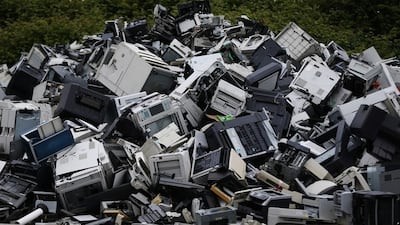Throwing away a hair dryer is 20 times more harmful to the environment than a plastic water bottle, but recycling such items could be worth billions of dollars.
Electronic waste, or e-waste, is increasing as everyone becomes more digital coupled with a rise in population. The global market for recycling items such as old mobile phones and computers, kitchen appliances or even expired credit cards is forecast to reach US$5 billion by 2020. This is more than a 20 per cent compounded annual growth rate from 2014, according to a report by US research firm MarketsandMarkets.
The average resident in the UAE generated around 17 kilograms of e-waste in 2014, mostly sending them to landfills with materials that can take over 100 years to degrade, according to a UN-sponsored study.
Dubai-based waste management firm, Averda, which has operations in 13 countries, said it has seen its e-waste rise from 2 per cent to reach 10 per cent of its total waste collected globally over the past five years. "When we began putting recycling stations around Dubai, we would get laptops that were more than 20 years old - and they were just massive," said Mariam Ansari, marketing manager for Averda.
While breaking down electronics and redistributing parts is only part of Averda's operations, e-waste has helped the company grow its global operations 10 times over the past decade. "We're expanding our offerings in the UAE. The market is expanding and so are we," Ms Ansari said.
Averda currently operates 11 recycling centres in Dubai, which are part of an initiative by the Dubai Municipality. The company said another four drop-off points will be introduced over the next year, and each of the centre is powered by solar.
But the problem is more with an individual than a business. "The biggest challenge is usually the general population," she said, adding that discarding of electronics is relatively new. "There are many people that would like to recycle, but they don't have the outlets."
Ms Ansari said the impact from e-waste on the environment was 20 per cent more than paper and plastics. And this is why the company has partnered with other businesses in Dubai to help raise awareness while making it easy for residents to dispose materials that leak harmful toxins if placed in a landfill.
Dubai Science Park (DSP) faced the same issue for discarding a large, 10-year-old printer. "No one would take it from us because it was so old, so we decided to create a programme," said Marwan Al Janahi, the executive director of DSP. "We've noticed in the last few years, there has been a lot going on in terms of recycling whether it's segregating at other sources or at collection - and we want to figure out ways that we can improve."
The initiative to collect old electronics seemed like a natural fit for Dubai Internet City (DIC) - the hub of the emirate's information technology industry. Ammar Al Malik, the executive director of DIC, said: "It's not just about plastic bottles, but there are other things that we can do to save the environment."
Dubai Science Park, Internet City, Averda and Uber are partnering to collect electronic waste from seven communities in Dubai from July 4 to 6, coinciding with the World Environment Day.
Uber will drive through Internet City, Media City, Knowledge Park, Studio City, Science Park, International Academic City and Outsource City to pick up unwanted electronics. Businesses and residents can request "UberRECYCLE" via the Uber app. A driver will arrive to pick up the unwanted items and then transport them to Averda's premises for recycling or refurbishment.
"Last year we picked up around 65kg of e-waste in Dubai with five drivers and we had the idea of how to do it this year and make it bigger," said Christopher Free, the general manager at Uber UAE. He said Uber would scale up the amount of drivers collecting the waste depending on the need.
Items that can be donated include laptops, printers, tablets, mobile phones, CPUs, monitors, TVs, stereos, scanners, copiers, fax machines and other electronics.

Recycling company Averda disposes UAE's e-waste
Averda currently operates 11 recycling centres in Dubai,, which are part of an initiative by the Dubai Municipality.
Most popular today
